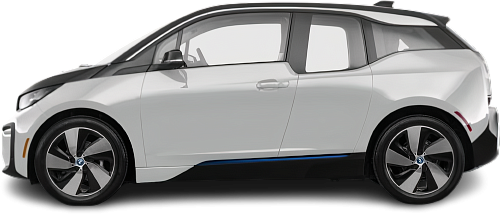USA EV Comparison: Škoda Citigo-e iV vs BMW i3 BEV 120 Ah
Struggling to Decide? Let AI Help!
Your AI Summary Is Ready!
General Info
Since both vehicles have been discontinued, they are now only available on the used car market. You can get the BMW i3 BEV 120 Ah (2018-2022) for as low as $14174, while the Škoda Citigo-e iV (2019-2021) was never offered for sale in the United States.
The two vehicles share the same body style: Hatchback.
| Property | Škoda Citigo-e iV | BMW i3 BEV 120 Ah |
|---|---|---|
| Years of Production | 2019-2021 | 2018-2022 |
| Current Status | Discontinued | Discontinued |
| Country of Manufacture | Slovakia | Germany |
| Body Style | Hatchback | Hatchback |
| Market Availability | EU | EU, USA |
| Price USA (Used) | - Price USA (Used) | $14174 |
| GCC Score | 4.4 | 5.3 |
Range and Efficiency
While the BMW i3 BEV 120 Ah (2018-2022) offers a longer real-world range and a bigger battery, it is less energy-efficient than the Škoda Citigo-e iV (2019-2021).
| Property | Škoda Citigo-e iV | BMW i3 BEV 120 Ah |
|---|---|---|
| Range (EPA) | - Range (EPA) | 153 mi |
| Range (WLTP) | 160 mi | 191 mi |
| Range (GCC) | 135 mi | 158 mi |
| Battery Capacity (Nominal) | 36.8 kWh | 42.2 kWh |
| Battery Capacity (Usable) | 32.3 kWh | 37.9 kWh |
| Efficiency per 100 mi | 23.9 kWh/100 mi | 24 kWh/100 mi |
| Efficiency per kWh | 4.18 mi/kWh | 4.17 mi/kWh |
| Range and Efficiency Score | 5.9 | 6.1 |
Charging
Both vehicles utilize a standard 400-volt architecture.
The BMW i3 BEV 120 Ah (2018-2022) offers faster charging speeds at DC stations, reaching up to 50 kW, while the Škoda Citigo-e iV (2019-2021) maxes out at 40 kW.
The BMW i3 BEV 120 Ah (2018-2022) features a more powerful on-board charger, supporting a maximum AC charging power of 11 kW, whereas the Škoda Citigo-e iV (2019-2021) is limited to 7.2 kW.
| Property | Škoda Citigo-e iV | BMW i3 BEV 120 Ah |
|---|---|---|
| Max Charging Power (AC) | 7.2 kW | 11 kW |
| Max Charging Power (DC) | 40 kW | 50 kW |
| Architecture | 400 V | 400 V |
| Charge Port | CCS Type 2 | CCS Type 1 |
| Charging Score | 3.9 | 5.2 |
Performance
The BMW i3 BEV 120 Ah (2018-2022) is rear-wheel drive, while the Škoda Citigo-e iV (2019-2021) offers a front-wheel drive system.
The BMW i3 BEV 120 Ah (2018-2022) boasts greater motor power and accelerates faster from 0 to 60 mph.
| Property | Škoda Citigo-e iV | BMW i3 BEV 120 Ah |
|---|---|---|
| Drive Type | FWD | RWD |
| Motor Type | PMSM | PMSM |
| Motor Power (kW) | 61 kW | 135 kW |
| Motor Power (hp) | 82 hp | 181 hp |
| Motor Torque | 156 lb-ft | 184 lb-ft |
| 0-60 mph | 11.8 s | 7.2 s |
| Top Speed | 81 mph | 93 mph |
| Performance Score | 1.7 | 3.2 |
Dimensions
The BMW i3 BEV 120 Ah (2018-2022) is longer, wider, and taller.
The BMW i3 BEV 120 Ah (2018-2022) boasts a more extended wheelbase.
| Property | Škoda Citigo-e iV | BMW i3 BEV 120 Ah |
|---|---|---|
| Length | 141.6 in | 157.9 in |
| Width (with Mirrors) | - Width (with Mirrors) | 80.3 in |
| Width (w/o Mirrors) | 64.8 in | 69.9 in |
| Height | 58.3 in | 62.9 in |
| Wheelbase | 95.4 in | 101.2 in |
Cargo and Towing
The BMW i3 BEV 120 Ah (2018-2022) provides more cargo capacity, featuring both a larger trunk and more space with the rear seats folded.
Neither car is equipped with a frunk (front trunk).
Neither vehicle is officially rated for towing in the US.
| Property | Škoda Citigo-e iV | BMW i3 BEV 120 Ah |
|---|---|---|
| Number of Seats | 4 | 4 |
| Curb Weight | 2723 lb | 2972 lb |
| Cargo Volume (Trunk) | 8.8 ft3 | 9.2 ft3 |
| Cargo Volume (Max) | 32.6 ft3 | 38.8 ft3 |
| Cargo Volume (Frunk) | - Cargo Volume (Frunk) | - Cargo Volume (Frunk) |
| Towing Capacity | - Towing Capacity | - Towing Capacity |
| Cargo and Towing Score | 3.6 | 4.3 |




